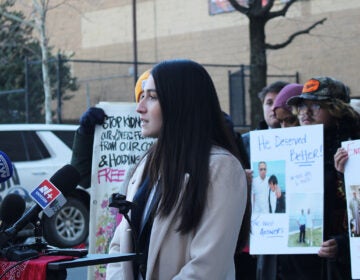Man who illegally crossed border twice, molested young girl gets more prison time
An unauthorized immigrant from Honduras will serve more time in prison after molesting a young girl following his second illegal border crossing into the U.S.

The federal courthouse in Philadelphia (Kimberly Paynter/WHYY)
A federal judge in Philadelphia has sentenced a Honduran man who molested a young girl after twice illegally entering the U.S. to seven more months in prison Tuesday.
“This assault will undoubtedly cause the victim continuing harm, including psychological trauma,” wrote federal prosecutors in their sentencing memo filed ahead of the hearing.

Lester Antonio Dionicio-Elias, 34, will be deported to Honduras when he completes a prison sentence of just three months; the four months he has been in federal custody will be credited toward his punishment.
It will mark the second time immigration authorities removed Dionicio-Elias from the U.S., and it comes just as lawmakers in Washington, D.C., debate shutting down the federal government over President Donald Trump’s demand for billions of dollars to build a border wall with Mexico.
Escaping what his lawyers called “persistent violence” in Honduras, Dionicio-Elias re-entered the country in 2008, a year after he was first deported. He lived with his mother and other family in Upper Darby while working as a sous chef at a nearby country club.
In 2011, he molested an 11-year-old girl who was living with the family. He pleaded guilty to aggravated indecent assault of a minor and served more than four years in prison in Delaware County.
Dionicio-Elias was supposed to be on parole for an additional six years, followed by a decade of probation. Though agents from U.S. Immigration and Customs Enforcement had interviewed Dionicio-Elias, they decided to wait until he was released from local custody before arresting him on another charge of illegally crossing the border.
The federal prison guidelines for a conviction on re-entering the country after deportation range from one to seven months. But prosecutors argued Tuesday that the judge should imprison Dionicio-Elias beyond the guidelines to a sentence of around two years.
His public defender countered that the time he has already spent in a federal cell is enough, saying though he is “scared” to go back to Honduras, he should be immediately deported, rather than spend more time behind bars in the U.S.
U.S. District Judge Joel Slomsky rejected both requests Tuesday, and he ordered that Dionicio-Elias be imprisoned for a term near the high end of the guidelines.
“He was told at the border, don’t come back. He ignored that advice. He came back and showed no respect for the law,” Slomsky said. “Then he committed a heinous crime.”
In requesting no additional prison time, federal defender Nancy MacEoin told the judge taxpayers would be on the hook for the $3,000 monthly cost of incarcerating Dionicio-Elias. Why not just deport him now, MacEoin asked.
“He knows if he comes back to the United States, he will be facing four walls in a cell,” she said. “Any sentence imposed on this defendant is not going to deter people from trying to cross the border.”
Yet Assistant U.S. Attorney Meaghan Flannery argued incarcerating him would send a deterrent message to others thinking about crossing the border illegally. What’s more, Flannery said, Dionicio-Elias’ prior criminal history should not be taken out of the equation, since he could pose a threat to others if he ever gains his freedom in the U.S.
Don’t forget, she told the judge, “the defendant forced himself on an 11-year-old victim.”
Dionicio-Elias, a father of two with a fifth-grade education, wore a green jumpsuit and sat between MacEoin and an interpreter during Tuesday’s hearing.
“I apologize for failing,” he told the judge through an interpreter. “I know I have committed a crime, but this whole time, my children have needed me, and I have been helping them.”
Dionicio-Elias told the judge he has a place to live and construction work awaiting him in Honduras.
“I will never come back to this country,” he said.
WHYY is your source for fact-based, in-depth journalism and information. As a nonprofit organization, we rely on financial support from readers like you. Please give today.




